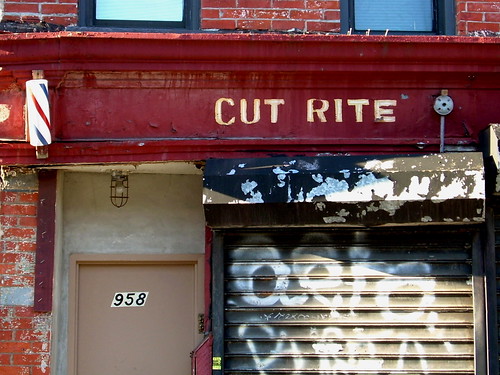
We missed a solid piece in the Village Voice earlier this week called The Second Battle of Bushwick, as a reader pointed out to us. It is long, detailed and chronicles the way Bushwick is changing and who is paying the price. The article–which runs five full screens if you read it online–bears Tom Robbins byline. If you read one detailed story this week, this should be it.
From the way it starts in the bizarre condo at 358 Grove Street to the stomach churning detail about the foul treatment of longtime Bushwick residents (illegal rent hikes, blatant harrassment, housing code violations of Biblical proportion, etc.) being pushed out to make way for the complete rebranding of their neighborhood as an extension of Williamsburg, The Second Battle covers a lot of ground. Consider the amusing real estate sales babble at 358 Grove:
“This is the continuation of Williamsburg,” insists the condo’s frantic real estate agent, dashing about the sixth-floor sales office. “Look,” he says, burbling the happy nonsense of a salesman, “people in the neighborhood are ready to take their lives to the next level.”
What’s at work here is straight out of the brokers’ handbook: Link the property in buyers’ minds to the worldwide cachet of that now-prosperous and booming neighborhood a couple miles west of here. “The Peter Luger Steakhouse is just a couple of blocks away,” the agent says, leaning over an unfinished rooftop cabana. Actually, Peter Luger’s is a solid eight subway stops away from here on the M train that rumbles along Myrtle Avenue. But no matter. There are some very solid marketing rationales for this approach.
Or, consider the rundown of the change and the consequences:
Now, step by step—or stop by stop, since the burgeoning hipoisie have largely followed the path of the overcrowded L train through Brooklyn—it’s arrived in Bushwick.
Not that that’s a bad thing, by most measures. A neighborhood that ranks in the top 10 poorest areas of the city, that has the highest rate of asthma hospitalizations and the most serious housing-code violations, can use all the help it can get. New investment means new residents, new stores, new jobs. And, whether city fathers choose to admit it or not, it means much closer municipal attention to crime and the quality of local life. For those who already own a modest piece of the rock, and who held on through the bad years, rising real estate values also yield a once-in-a-lifetime bonanza, a hike in net worth that trickles down to the rest of the family, providing a nice cushion against an otherwise fickle economy…The people directly in harm’s way, however, are those clinging to the lower rungs of the economic ladder: renters who never came close to raising a down payment for their own home, let alone a sparkling new condo with granite counters and backsplash. For those living in buildings of fewer than six units—the cutoff for rent-regulation protections—it’s just their hard luck: Eviction is usually as simple as a lapsed lease and a new rent set far beyond the pocketbook of the current tenant.
There are many individual stories within the article. Carve out some time, if you can, and read.
